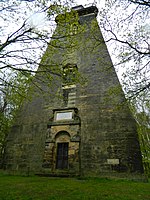Wentworth (UK Parliament constituency)
Constituencies of the Parliament of the United Kingdom disestablished in 1950Constituencies of the Parliament of the United Kingdom disestablished in 2010Constituencies of the Parliament of the United Kingdom established in 1918Constituencies of the Parliament of the United Kingdom established in 1983Pages with non-numeric formatnum arguments ... and 4 more
Parliamentary constituencies in Yorkshire and the Humber (historic)Politics of BarnsleyPolitics of RotherhamUse British English from March 2020

Wentworth was a parliamentary constituency in South Yorkshire. Originally created in 1918 and was abolished in 1950, the name was revived when a new constituency was created from 1983 to 2010. Throughout its history, Wentworth was a safe seat for the Labour Party.
Excerpt from the Wikipedia article Wentworth (UK Parliament constituency) (License: CC BY-SA 3.0, Authors, Images).Wentworth (UK Parliament constituency)
Hoober Lane,
Geographical coordinates (GPS) Address Nearby Places Show on map
Geographical coordinates (GPS)
| Latitude | Longitude |
|---|---|
| N 53.475 ° | E -1.375 ° |
Address
Hoober Lane
Hoober Lane
S62 7RX
England, United Kingdom
Open on Google Maps






